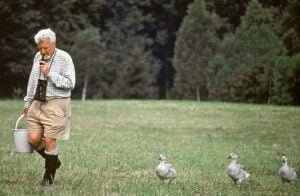Ethological Perspective of Development
Ethology is concerned with the adaptive, or survival, value of behavior and its evolutionary history. Its roots can be traced to the work of Darwin. Two European zoologists, Konrad Lorenz and Niko Tinbergen, laid foundation of it.
Ethology examines the ways in which our biological makeup influences our behavior. Konrad Lorenz, proponent of ethology, discovered that newborn geese are genetically preprogrammed to become attached to the first moving object they see after birth.
Concept of Imprinting
Imprinting takes place during an early, restricted period of development. the early following behavior of certain baby birds, such as geese, which ensures that the young will stay close to the mother and be fed and protected from danger (Lorenz, 1952). If the mother goose is absent during this time but an object resembling her in important features is present, young goslings may imprint on it instead.

Konrad Lorenz geese experiment
The Critical Period- Observations of imprinting led to a major concept in child development, It refers to a limited time during which the child is biologically prepared to acquire certain adaptive behaviors but needs the support of an appropriately stimulating environment.
A Sensitive Period – It is a time that is optimal for certain capacities to emerge because the individual is especially responsive to environmental influences. Development can occur later, but it is harder to induce.
John Bowlby (1969) Study to understanding the human caregiver–infant relationship. He argued that infant smiling, babbling, grasping, and crying are built-in social signals that encourage the caregiver to approach, care for, and interact with the baby.
Behavioral genetics studies the effects of heredity on behavior. Lorenz work demonstrated the importance of biological determinants in influencing behavior patterns, eventually led developmentalists to consider the ways in which human behavior might reflect inborn genetic patterns.
Evolutionary Perspective of Development
The evolutionary perspective seeks to identify behavior that is the result of our genetic inheritance from our ancestors (Bjorklund, 2005; Goetz & Shackelford, 2006). The evolutionary perspective draws heavily on the field of ethology.
Darwin (the Origin of Species,1859) argued that a process of natural selection creates traits in a species that are adaptive to its environment. On the basis of above argument, evolutionary approaches put forward that our genetic inheritance determines not only such physical traits as skin and eye color, but certain personality traits and social behaviors as well.
For example, shyness and jealousy are produced in part by genetic causes, because they helped increase the survival rates of humans’ ancient relatives (Easton, Schipper, & Shackelford, 2007; Buss, 2003, 2009, 2012).
It seeks to understand the adaptive value of species-wide cognitive, emotional, and social competencies as those competencies change with age (Geary, 2006b; King & Bjorklund, 2010).
Ask questions like – What role does the newborn’s visual preference for face like stimuli play in survival? Why do children play in gender-segregated groups?
Evolutionary psychologists are not just concerned with the genetic & biological roots of development. They recognize that humans’ large brain and extended childhood resulted from the need to master the complexities of human group life, so they are also interested in learning (Bjorklund, Causey, & Periss, 2009).
Evolutionary psychologists realize that today’s lifestyles differ so radically from those of our evolutionary ancestors that certain evolved behaviors, such as life-threatening risk taking in adolescents and male-to-male violence, are no longer adaptive (Blasi & Bjorklund, 2003). Evolutionary developmental psychology may help in development of effective interventions
Critical Evaluation of Evolutionary Perspective
Pros – It focus on genetic and biological aspects of behavior,
Cons- the evolutionary perspective ignores the environmental and social factors involved in producing children’s and adults’ behavior.
References-
Feldman, R. S., & Babu, N. (2011). Discovering the Life Span. Indian subcontinent adaptation, New Delhi: Dorling Kindersley India pvt ltd.
Berk, L. E. (2004). Development through the lifespan. (3rd Ed). New Delhi: Pearson Education Dorling Kindersley India pvt ltd.
